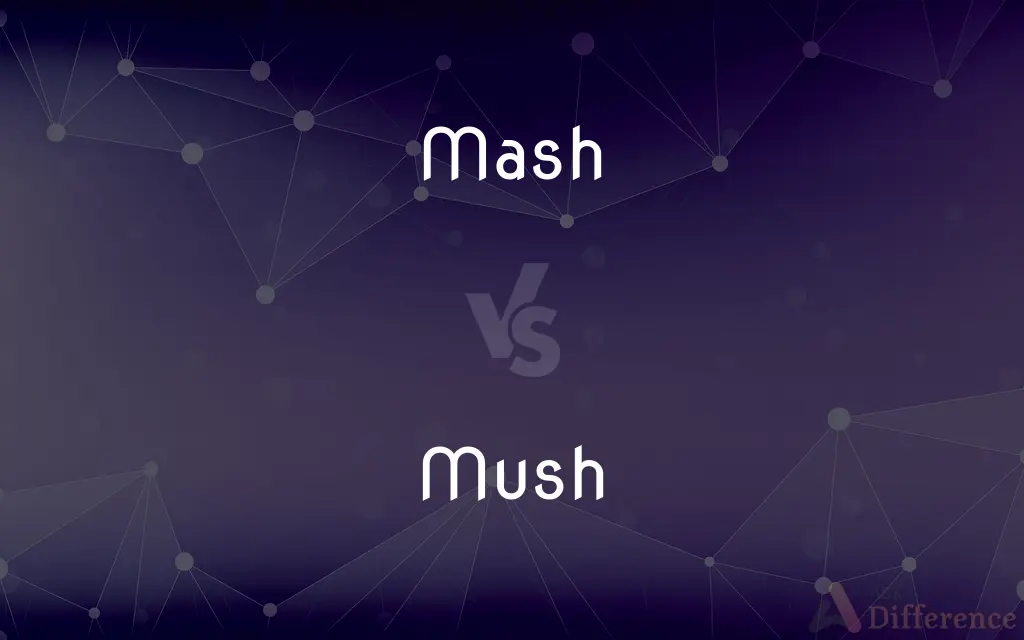Mash vs. Mush — What's the Difference?
By Tayyaba Rehman & Maham Liaqat — Updated on April 24, 2024
"Mash" refers to a mixture obtained by crushing ingredients, often used in cooking, while "mush" denotes a soft, wet, pulpy mass, typically less defined in texture.

Difference Between Mash and Mush
Table of Contents
ADVERTISEMENT
Key Differences
Mash is primarily associated with food preparation, where ingredients such as potatoes are crushed to create a consistent, homogenized product. On the other hand, mush can refer to any softened mixture, often resulting from soaking solid food in liquid until it breaks down, such as oatmeal.
The texture of mash is generally smoother and more deliberate, used as a side dish in meals or in brewing (e.g., malt mash). Whereas mush is typically coarser and used in different contexts like porridge or animal feed.
Mash is often prepared by applying a physical force, like mashing potatoes with a masher or mixer, ensuring a controlled texture. Conversely, mush forms when materials naturally disintegrate in liquid over time, or through minimal stirring.
In culinary terms, mash is used specifically to describe certain dishes (e.g., mashed potatoes), highlighting its role in specific recipes. Mush, however, is used more broadly to describe various food textures or conditions, such as baby food or a derogatory term for subpar food.
The term mash also extends beyond culinary use, appearing in industrial contexts, such as the mash used in brewing and distilling. In contrast, mush is rarely used in a technical or industrial context and maintains a more casual or colloquial usage.
ADVERTISEMENT
Comparison Chart
Definition
A mixture created by crushing ingredients.
A soft, wet, pulpy mass.
Texture
Smooth, even consistency.
Coarse, uneven consistency.
Preparation
Physical force applied, like mashing potatoes.
Material breaks down naturally in liquid.
Culinary Use
Specific dishes (e.g., mashed potatoes).
Broad use (e.g., porridge, baby food).
Other Contexts
Used in brewing and distilling.
Primarily culinary or colloquial.
Compare with Definitions
Mash
A dish of mashed potatoes or other vegetables.
She served a creamy garlic mash alongside the steak.
Mush
A soft or pulpy mass.
The overcooked vegetables turned into mush.
Mash
The mixture of grain and water used in brewing.
The brewery tour included a demonstration of preparing the mash.
Mush
To become soft and pulpy.
The paper mushed up in the water.
Mash
A crushed mixture used in animal feed.
They prepared a mash of grains for the livestock.
Mush
Anything that lacks firmness or structure.
After the rain, the playground was a mushy mess.
Mash
Any soft, consistent mixture created by mashing.
The recipe called for a banana mash to be added to the batter.
Mush
Porridge or any similar dish made from boiled cereal.
Breakfast often included a bowl of hot mush.
Mash
To crush food to achieve a smooth texture.
He mashed the avocados to make guacamole.
Mush
Colloquially, something very sentimental or overly emotional.
The movie was pure mush, filled with cliché romantic scenes.
Mash
A mixture of malt or other ingredients with water, heated to convert starches into fermentable sugars for use in brewing or distilling.
Mush
A thick porridge or pudding of cornmeal boiled in water or milk.
Mash
A mixture of ground grain and nutrients fed to livestock and fowl.
Mush
Something thick, soft, and pulpy.
Mash
A soft pulpy mixture or mass.
Mush
(Informal) Mawkish sentimentality, affection, or amorousness.
Mash
Chiefly British Mashed potatoes.
Mush
A journey, especially by dogsled.
Mash
A crushing or grinding.
Mush
To reduce to mush; mash or crush.
Mash
(Slang) An infatuation or act of flirtation.
Mush
To travel, especially over snow with a dogsled.
Mash
To convert (malt or grain) into mash.
Mush
To drive (a dogsled or team of dogs).
Mash
To convert into a soft pulpy mass by pounding or crushing
Mash potatoes.
Mush
Used to command a team of dogs to begin pulling or move faster.
Mash
Chiefly Southern & South Midland US To apply pressure to; press.
Mush
A somewhat liquid mess, often of food; a soft or semisolid substance.
Mash
(uncountable) A mass of mixed ingredients reduced to a soft pulpy state by beating or pressure; a mass of anything in a soft pulpy state.
Mush
(radio) A mixture of noise produced by the harmonics of continuous-wave stations.
Mash
(brewing) Ground or bruised malt, or meal of rye, wheat, corn, or other grain (or a mixture of malt and meal) steeped and stirred in hot water for making the wort.
Mush
(surfing) The foam of a breaker.
Mash
(mostly UK) Mashed potatoes.
Mush
(geology) A magmatic body containing a significant proportion of crystals suspended in the liquid phase or melt.
Mash
A mixture of meal or bran and water fed to animals.
Mush
A food comprising cracked or rolled grains cooked in water or milk; porridge.
Mash
(obsolete) A mess; trouble.
Mush
Cornmeal cooked in water and served as a porridge or as a thick sidedish like grits or mashed potatoes.
Mash
(obsolete) A mesh.
Mush
A walk, especially across the snow with dogs.
Mash
(obsolete) An infatuation, a crush, a fancy.
Mush
A magic mushroom.
Mash
(obsolete) A dandy, a masher.
Mush
The face.
Mash
A gun.
Mush
To squish so as to break into smaller pieces or to combine with something else.
He mushed the ingredients together.
Mash
(transitive) To convert into a mash; to reduce to a soft pulpy state by beating or pressure
We had fun mashing apples in a mill.
The potatoes need to be mashed.
Mush
(intransitive) To walk, especially across the snow with dogs.
Mash
(transitive) In brewing, to convert (for example malt, or malt and meal) into the mash which makes wort.
Mush
(transitive) To drive dogs, usually pulling a sled, across the snow.
Mash
(ambitransitive) To press down hard (on).
To mash on a bicycle pedal
Mush
(transitive) To notch, cut, or indent (cloth, etc.) with a stamp.
Mash
To press. en
Mush
A directive given (usually to dogs or a horse) to start moving, or to move faster.
Mash
To prepare a cup of tea in a teapot; to brew (tea).
Mush
Meal (esp. Indian meal) boiled in water; hasty pudding; supawn.
Mash
To act violently.
Mush
A march on foot, esp. across the snow with dogs; as, he had a long mush before him; - also used attributively.
Mash
To press (a button) rapidly and repeatedly.
Mush
To notch, cut, or indent, as cloth, with a stamp.
Mash
To flirt, to make eyes, to make romantic advances.
Mush
To travel on foot, esp. across the snow with dogs.
Mash
An abbreviation for Mobile Army Surgical Hospital, consisting of the equipment and personnel required to perform emergency operations on injured soldiers, located in tents near the front lines of combat; as, he worked in the 25th MASH.
Mush
Any soft or soggy mass;
He pounded it to a pulp
Mash
A mesh.
Mush
Cornmeal boiled in water
Mash
A mass of mixed ingredients reduced to a soft pulpy state by beating or pressure; a mass of anything in a soft pulpy state. Specifically (Brewing), ground or bruised malt, or meal of rye, wheat, corn, or other grain (or a mixture of malt and meal) steeped and stirred in hot water for making the wort.
Mush
An expression that is excessively sweet and sentimental
Mash
A mixture of meal or bran and water fed to animals.
Mush
A journey by dogsled
Mash
A mess; trouble.
Mush
Drive (a team of dogs or a dogsled)
Mash
To convert into a mash; to reduce to a soft pulpy state by beating or pressure; to bruise; to crush; as, to mash apples in a mill, or potatoes with a pestle.
Mush
Travel with a dogsled
Mash
A mixture of mashed malt grains and hot water; used in brewing
Mash
Mixture of ground animal feeds
Mash
To compress with violence, out of natural shape or condition;
Crush an aluminum can
Squeeze a lemon
Mash
Talk or behave amorously, without serious intentions;
The guys always try to chat up the new secretaries
My husband never flirts with other women
Mash
Reduce to small pieces or particles by pounding or abrading;
Grind the spices in a mortar
Mash the garlic
Common Curiosities
How is the texture of mush beneficial in certain dishes?
The coarser, softer texture of mush makes it ideal for dishes like porridge, where a creamy consistency is desired.
What ingredients are commonly used in mash?
Common ingredients for mash include potatoes, sweet potatoes, and other root vegetables.
What are some examples of mush in traditional cuisines?
Traditional cuisines might include cornmeal mush in American Southern cooking or rice mush in Asian dishes.
Can mash be considered a comfort food?
Yes, dishes like mashed potatoes are often considered comfort food due to their warm, creamy texture.
Is there a specific tool used for making mash?
Yes, a potato masher or a food mill is typically used to make mash to ensure smooth texture.
What is the nutritional value comparison between mash and mush?
Nutritional values depend largely on the ingredients, but both can be nutritious depending on the base food used, like grains or vegetables.
Are there cultural preferences for mash or mush?
Yes, cultural preferences vary; for example, mashed potatoes are popular in Western cuisine, while rice mush is a staple in Asian diets.
How do variations in ingredients affect the flavor of mash and mush?
Variations in ingredients can greatly affect flavor; for instance, using sweet potatoes versus white potatoes in mash, or different types of grains in mush.
Is mush suitable for people with chewing difficulties?
Yes, due to its soft texture, mush is suitable for those with chewing difficulties or those who require soft diets.
How do you prevent mash from becoming mush?
Controlling the amount of mashing and avoiding excessive liquid can help keep mash from becoming too mushy.
What role does mash play in home brewing?
In home brewing, mash is crucial for extracting fermentable sugars from grains, which yeast then ferments into alcohol.
What is the historical significance of mush in food preparation?
Historically, mush has been a basic, economical food that provided sustenance in various cultures, often made from readily available grains.
What are some modern culinary innovations using mash or mush?
Modern innovations include using flavored mashes, like garlic or herb-infused mash, and incorporating exotic grains into mush for new textures and flavors.
How does the cooking method affect the outcome of mush?
Slow cooking or boiling at low temperatures tends to produce a mushier texture, ideal for porridge or stewed dishes.
Can mash be used as a base for other recipes?
Yes, mash can be used as a base for dishes like shepherd’s pie or as a thickener for soups and stews.
Share Your Discovery

Previous Comparison
Roma vs. Rome
Next Comparison
Pact vs. PackAuthor Spotlight
Written by
Tayyaba RehmanTayyaba Rehman is a distinguished writer, currently serving as a primary contributor to askdifference.com. As a researcher in semantics and etymology, Tayyaba's passion for the complexity of languages and their distinctions has found a perfect home on the platform. Tayyaba delves into the intricacies of language, distinguishing between commonly confused words and phrases, thereby providing clarity for readers worldwide.
Co-written by
Maham Liaqat













































